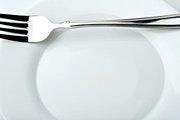However, there is also research out there that raises concerns regarding consuming this type of protein. For instance, one study showed that soy protein contains a natural chemical that mimics estrogen.
Several cancer studies funded by the National Institutes of Health showed that estrogen-dependent tumor growth increased as the isoflavone content increased in the soy-based diet. (
Journal of Nutrition, November 2001) Another study frequently referred to that was published in the
Journal of Urology in April 2003; it states that a chemical found in soybeans (genistein) may contribute to the development of abnormal reproductive organs that may lead to sexual dysfunction.
Start Your Day Right
Eating breakfast is an important part of attaining and maintaining a healthy lifestyle, and studies show that eating a low-fat breakfast high in complex carbohydrates from fruits and vegetables and with at least some protein will help you lose weight. Many Americans routinely skip breakfast under the false belief that eliminating morning calories may help with weight loss. By choosing not to include breakfast, particularly breakfast that includes some protein, you may be putting your health in danger.
In fact, studies have shown that people who do not have protein at breakfast are more likely to be overweight, have less energy and have higher cholesterol levels than those who always eat a healthy, well-rounded breakfast. Research conducted at the University of Pittsburgh School of Medicine states: "Eating breakfast, particularly if it contains some protein, can hold off hunger for hours. Your body converts the amino acids from proteins into blood sugar. Amino acids act as tiny blood sugar time-release capsules that can keep you from overeating."
Don't know where to start when it comes to breakfast? Choose foods that are natural and unprocessed. Eat whole fruit rather than fruit juice. Whole fruits provide extra fiber. Protein sources include a variety of vegetables, eggs, fish, lean meat, seeds and nuts. If your excuse is that you don't have time to include healthy protein at breakfast, here's your answer: Try one of the many delicious tasting breakfast meal replacement shakes on the market. Make sure you choose a shake that is not loaded with chemicals and tons of sugar. With a little research you can find a great tasting vegetarian/vegan shake that uses plant proteins. Other key ingredients to look for include a super greens blend and essential fatty acids. A meal replacement shake can be made in a minute and fuels your body right through the morning. It's the ultimate fast food and so good for you. Ask your doctor for a recommendation.
Harness the Power of Protein
When it comes to protein, don't fool yourself, "fuel" yourself. Build a protein-based breakfast into your morning breakfast routine and make sure you get protein throughout the day. Remember, don't overload on animal-based protein; small amounts of lean meat like chicken, turkey or fish are OK (4 ounces a day at most), but make sure plant proteins form the staple of your diet. You'll look better, feel better and improve your quality of life, all at the same time.
 Creating a Complete Protein: The Story of Rice and Beans
Creating a Complete Protein: The Story of Rice and Beans
Rice and beans are a classic example of a complete protein dish. Separately, neither food contains all eight essential amino acids and are thus classified as incomplete proteins; but when combined (eaten together or within close proximity to one another), they form a complete protein that provides the body with the essential amino acids your body needs. (By the way, they are also a rich source of complex carbohydrates and nutrients, particularly whole-grain rice and whole beans prepared without lard.)
 The Essential 8: Amino Acids We Need to Get From Food
The Essential 8: Amino Acids We Need to Get From Food
There are 20 amino acids, of which eight are deemed essential because they cannot be synthesized by the body alone and thus must be provided by dietary sources. Here are the big eight, some of which you may recognize by name. (Note: Four other amino acids, arginine, cysteine, histidine and tyrosine, are required by infants and young children.)
| Isoleucine | Methionine | Threonine | Valine |
| Lysine | Phenylalanine | Tryptophan | Leucine |
Donald L. Hayes, DC, graduated from Western States Chiropractic College in 1977 and is the author of five health and wellness books including his latest, Weight Loss to Wellness. To learn more, visit www.greensfirst.com.

